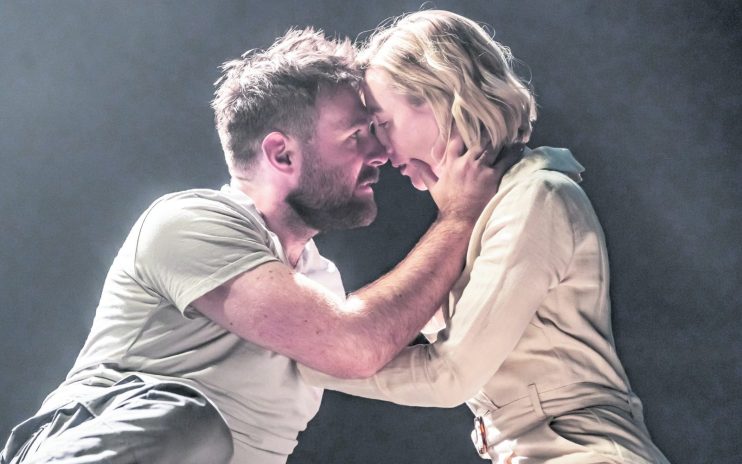Best of 2021: The Tragedy of Macbeth at the Almeida

South African director Yaël Farber’s The Tragedy of Macbeth will fill the Almeida thanks to her casting of four-times Oscar nominee Saoirse Ronan, but it will be remembered long after the run has ended as one of the most strikingly original, hauntingly atmospheric productions of the Scottish Play in recent times.
The tone is set from the start, when the tales of Macbeth’s bravery in battle are recounted not with their usual gusto but with a kind of dull dread. A bloodied soldier attempts to clean himself using an on-stage tap – presaging another famous hand washer – the air thick with a fine, foggy mist that lingers throughout the play, the soundscape muddied by a cinematic, Lynchian drone.
This is a play that cares as much about atmosphere as it does iambic pentameter, immersing the audience in the dark and dirty world of a Scotland at war. Although the dress is modern – Lady Macbeth clad in a white jumpsuit is a starkly angelic figure amongst the neutral tones of the fatigue-wearing soldiers – the period is left deliberately vague. Vera Lynn’s “We’ll Meet Again” haunts the soundtrack and scenes are reimagined with ingenious modern twists, such as the banquet, at which the Macbeths give a speech to the audience through a reverb-laden microphone.
Ronan shows why she’s one of the most acclaimed actors of her generation with a Lady Macbeth for the ages. She feels the thrill of power on a visceral, sexual level, practically panting with desire; never has the “come” in “Come, thick night” been spoken quite so much like it should be spelled with a “u”.
It’s only when Macbeth starts murdering kiddies that she goes downhill, her eventual off-stage death occurring very much on-stage in typically dramatic fashion.
James McArdle is almost her equal as the mad tyrant. Perhaps best known from the National Theatre’s revival of Angels in America, he’s endearingly brittle, a soldier in far past his depth, his murderous rampage fuelled by guilt and madness as much as lust for power. He maintains a warmth almost until the end, adding a glimpse of the titular “tragedy” that’s often missing from productions of Macbeth.
The wyrd sisters appear as besuited cosmic administrators, taking little pleasure in their work, simply maintaining some terrible, unknowable universal balance. They stalk the stage throughout, watching the chaos unravel with chilling indifference.
Farber isn’t known for her sense of humour but there are moments of physical comedy, especially from McArdle, who raised laughs with his flamboyant way of tucking in his kilt when he sits in order to avoid flashing the front row.
Despite clocking in at almost three hours – more of a Hamlet or Lear run-time than a Macbeth – it flies by, each scene so intricately crafted and exceptionally acted that you begin to mourn their passing as the play nears its conclusion. Farber is so confident she even dares to introduce a quasi-twist in the final moments, a tempting of fate that could have left a bitter taste in a lesser production.
It is, in short, an exceptional Macbeth, even greater than the sum of its talented parts. Expect this team to be collecting an armful of awards in the coming months.
